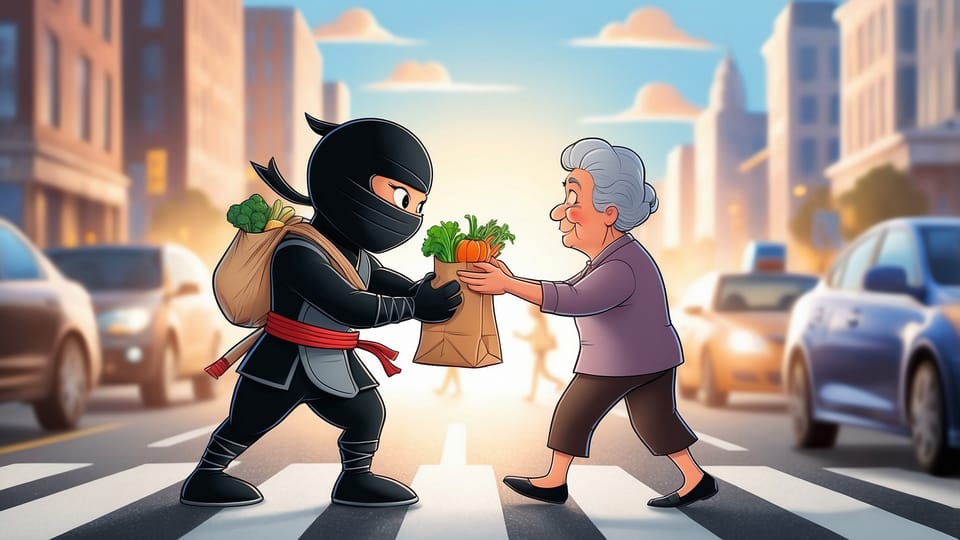The Elusive Third Thing: When Kindness Craves a Gold Star

You've just held the door open for someone laden with packages. They breeze past without so much as a nod. Suddenly, your good deed feels... less good. Sound familiar?
We've all been there, haven't we? Doing something nice, then waiting for that sweet, sweet acknowledgment. It's like we're all secretly auditioning for "Britain's Got Manners" or something. Although, should we really be seeking this validation? Or is the act itself enough?
Today, I’m diving headfirst into this very human tendency to want recognition for our good deeds. I'll explore why we seek it, what those old Stoic chaps might say about it, and how we can find contentment in the act itself, without needing that elusive third thing. Buckle up, Stoics-in-training, because we're about to embark on a journey of self-reflection that might just change the way you view your everyday actions. No pressure, though!
The Allure of the Third Thing: Why We're All Secret Praise Junkies
So, why do we crave that metaphorical gold star after doing something good? It's a quirk of human nature. We're social creatures, hardwired to seek approval from our tribe. This desire for recognition can sometimes overshadow the value of the act itself, like a needy puppy demanding treats for not chewing up the sofa.
Think about it. You hold the door open for someone, and they breeze past without a word. Suddenly, your good deed feels... less good. But why? The door's still open, isn't it? The person still got through, right? The act itself hasn't changed one bit. It's like the old philosophical question: If a tree falls in a forest and no one's around to say "thanks, tree", does it make a sound?
This craving for acknowledgment is what I call "The Third Thing." It's that extra bit we often seek after doing something kind or fulfilling a duty. But as the ancient Stoic philosopher Epictetus might say, "He who craves applause is a slave to the audience." Epictetus - interesting thought…
How to Be a Kindness Ninja
Now, if we could resurrect Marcus Aurelius for a chat (wouldn't that be a hoot?), he'd probably raise an eyebrow at our need for constant validation. The Stoics were big on doing the right thing simply because it's right, not for the gold stars or the Instagram likes. Imagine Marcus trying to explain that to a modern influencer.
Marcus himself wrote, "What is your art? To be good." Not "to be seen as good" or "to be praised as good," but simply "to be good." It's a subtle shift in perspective, but it's as powerful as a triple espresso on a Monday morning.
The Stoics would argue that true virtue lies in the action itself, not in the recognition that follows. It's about aligning your actions with your values, regardless of who's watching or what they might think. Imagine living like that – doing good deeds like a ninja, leaving only the impact of your kindness behind, no calling card required. Kindness Ninjas, unite!
How to Be Your Own Cheerleader
How do we make the leap from recognition-seekers to action-embracers? It starts with a shift in focus. Instead of fixating on the aftermath of our actions, we zero in on the actions themselves. It's like learning to enjoy the journey rather than fixating on the destination – except in this case, the journey is a series of small, meaningful actions that shape who we are.
Let's break it down:
- Intention: Before you act, check your motives. Are you doing this to genuinely help, or are you already picturing the thank-you note? If you find yourself rehearsing your "oh, it was nothing" speech, you might need to recalibrate.
- Presence: As you perform the act, be fully there. Feel the door handle as you hold it open. Notice the weight of the groceries you're carrying for your neighbor. Embrace the moment like it's the last HobNob in the packet.
- Reflection: Afterwards, instead of waiting for a "thank you," reflect on how the act aligned with your values. Did it make you feel more connected to your community? Did it challenge you in some way? Give yourself a mental high-five for being awesome.
By focusing on these aspects, we start to find fulfillment in the act itself. It's like becoming your own personal cheerleader, minus the pom-poms and the risk of pulling a muscle.
How to Become a Stealth Do-Gooder
Alright, fellow Stoics-in-training, let's get practical. How do we break free from the recognition rat race and find zen in the act itself? Here are some tips that even Seneca might nod approvingly at (if he wasn't too busy being, you know, stoic):
- The Invisible Hero Challenge: Try doing one good deed each day that absolutely no one will know about. It could be as simple as picking up litter when no one's around or leaving an anonymous note of encouragement. It's like being Batman, but with less fancy gadgets and more everyday kindness. Plus, no need for the uncomfortable spandex suit!
- The Reverse Gratitude Journal: Instead of writing down things you're grateful for, jot down acts of kindness you performed without seeking recognition. It's a subtle shift that puts the focus back on your actions. Bonus points if you can resist the urge to "accidentally" leave your journal open for others to see.
- The "What Would Cato Do?" Bracelet: Okay, it doesn't have to be Cato specifically, but choose a Stoic role model. When you're tempted to seek validation, glance at your wrist and ask yourself what they would do. (Spoiler: They'd probably just keep doing good stuff without fussing about it.) It's like a WWJD bracelet, but for philosophy nerds.
- The Recognition Redirect: When someone does thank you, try redirecting the focus. Say something like, "I'm just glad I could help" or "It was the right thing to do." It's not about dismissing gratitude, but about shifting the emphasis back to the act itself. Think of it as a Jedi mind trick, but for humility.
- The Virtue Checklist: At the end of each day, review your actions against the four Stoic virtues: Wisdom, Justice, Courage, and Temperance. Did your deeds align with these? If so, that's your gold star right there. No need to stick it on your forehead, though. That might send mixed messages.
How to Be a Zen Master of Kindness
As we wrap up this Stoic journey through the land of good deeds and elusive thank-yous, let’s take a moment to appreciate the freedom that comes with expecting nothing in return for our actions. It’s like decluttering your emotional house — suddenly, there’s so much more room for activities!
Imagine a world where every kind act, every fulfilled duty, every moment of goodness stands on its own — no strings attached, no validation required. It’s not just liberating; it’s downright revolutionary. You’d be like the Che Guevara of kindness, minus the beret and the controversial political legacy.
By focusing on the act itself, we free ourselves from the emotional rollercoaster of seeking approval. We become the authors of our own contentment, finding satisfaction in alignment with our values rather than in the fickle responses of others. It’s like being your own personal cheerleader, life coach, and motivational speaker all rolled into one — and you don’t even have to pay yourself!
So, the next time you hold that door open, help a colleague, or perform any act of kindness, savor the moment. Feel the alignment with your values, the connection to your community, the simple joy of doing good. And if that “thank you” never comes? Well, you’ll be too busy being awesome to notice.
Remember, in the grand Stoic scheme of things, it’s not about collecting gold stars or racking up karma points. It’s about being the best version of yourself, one invisible act of kindness at a time. Now go forth and be good — ninja style. Just don’t blame me if you start feeling the urge to wear all black and carry throwing stars. That’s a whole different kind of lifestyle change

Member discussion